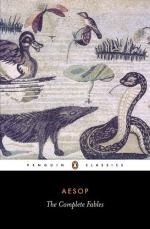THE WOLF AND THE SHEPHERD
A Wolf hung about near a flock of sheep for a long time, but made no attempt to molest them. The Shepherd at first kept a sharp eye on him, for he naturally thought he meant mischief: but as time went by and the Wolf showed no inclination to meddle with the flock, he began to look upon him more as a protector than as an enemy: and when one day some errand took him to the city, he felt no uneasiness at leaving the Wolf with the sheep. But as soon as his back was turned the Wolf attacked them and killed the greater number. When the Shepherd returned and saw the havoc he had wrought, he cried, “It serves me right for trusting my flock to a Wolf.”
THE FARMER AND THE STORK
A Farmer set some traps in a field which he had lately sown with corn, in order to catch the cranes which came to pick up the seed. When he returned to look at his traps he found several cranes caught, and among them a Stork, which begged to be let go, and said, “You ought not to kill me: I am not a crane, but a Stork, as you can easily see by my feathers, and I am the most honest and harmless of birds.” But the Farmer replied, “It’s nothing to me what you are: I find you among these cranes, who ruin my crops, and, like them, you shall suffer.”
If you choose bad companions
no one will believe that you are
anything but bad yourself.
THE CHARGER AND THE MILLER
A Horse, who had been used to carry his rider into battle, felt himself growing old and chose to work in a mill instead. He now no longer found himself stepping out proudly to the beating of the drums, but was compelled to slave away all day grinding the corn. Bewailing his hard lot, he said one day to the Miller, “Ah me! I was once a splendid war-horse, gaily caparisoned, and attended by a groom whose sole duty was to see to my wants. How different is my present condition! I wish I had never given up the battlefield for the mill.” The Miller replied with asperity, “It’s no use your regretting the past. Fortune has many ups and downs: you must just take them as they come.”
THE GRASSHOPPER AND THE OWL
An Owl, who lived in a hollow tree, was in the habit of feeding by night and sleeping by day; but her slumbers were greatly disturbed by the chirping of a Grasshopper, who had taken up his abode in the branches. She begged him repeatedly to have some consideration for her comfort, but the Grasshopper, if anything, only chirped the louder. At last the Owl could stand it no longer, but determined to rid herself of the pest by means of a trick. Addressing herself to the Grasshopper, she said in her pleasantest manner, “As I cannot sleep for your song, which, believe me, is as sweet as the notes of Apollo’s lyre, I have a mind to taste some nectar, which Minerva gave me the other day. Won’t you come in and join me?” The Grasshopper was flattered by the praise of his song, and his mouth, too, watered at the mention of the delicious drink, so he said he would be delighted. No sooner had he got inside the hollow where the Owl was sitting than she pounced upon him and ate him up.




